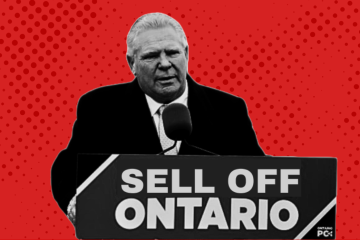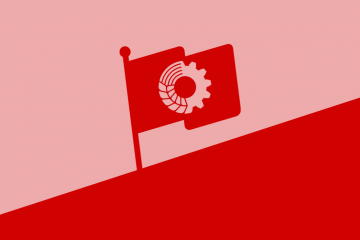Capitalism: the root of 2020’s intersecting crises
As the Ontario Provincial Committee of the Communist Party of Canada meets, Ontario, Canada and the capitalist world is still in the midst of a severe and worsening health crisis. The pandemic is compounded with other aspects of the overall capitalist crisis: economic, ecological and devastation through imperialist war and sanctions.
Last May we wrote, “Socialism has shown its ability to mobilize resources towards a common goal much more effectively than a system built to support private monopolies designed for profit.” This was increasingly obvious in May but it is even more apparent today. A quick comparative review of the confirmed COVID-19 death rate per one million residents is staggering. As of mid-November, Vietnam has had 0.4 deaths per million, Cuba has had 11 deaths per million, and China has had 3 deaths per million. Compare this with the Canadian death rate of 279 per million, the UK rate of 724 per million and the US’s 737 deaths per million inhabitants.
Despite the vast wealth of these imperialist countries, their ability to put the public health needs of their peoples ahead of corporate profits has been tested and they have failed. Socialism has shown itself as a system capable of rising to the pandemic’s challenge. In this sense we can say that the vast majority of the millions of deaths the pandemic has caused have been caused by global capitalism.
That being said, trends have emerged within capitalist countries as well. Countries with right-wing and ultra-right governments have shown themselves to be at odds with their own scientists and public health officials and have allowed for big business to continue with limited health and safety measures, meaning more sickness and death for the working class. This has largely been the approach of Ontario’s own Conservative government which has issued inadequate and contradictory health policies over the last eight months.
Even when compared to other capitalist governments, Ontario has done poorly. Ontario’s Auditor General reported in November that “Ontario’s response to COVID-19 in the winter and spring of 2020 was slower and more reactive relative to most other provinces and many other international jurisdictions.” Ford’s angry counter-offensive against the Auditor General’s report cannot hide the facts. The Ontario government has consistently underfunded health and education responses to the pandemic and Public Health officials have been ignored at several key junctures. The Province is now on track to overwhelm the healthcare system, potentially leading to exponentially more avoidable deaths.
Ford and his government have taken to blaming young people and individual actions for the spread of the virus. This is despicable scapegoating which obscures the fact that young people represent the vast majority of frontline service workers, mostly low-waged and often precariously employed, who have little economic option but to go to work, even though it risks their health and the health of their families. The Ontario Health Coalition has been gathering important data on workplace and school outbreaks which show that several industries are outpacing the increase in cases in the general public. The government’s rhetoric against young people and their emphasis on social gatherings is a dishonest maneuver which jettisons important public discussions around safety in workplaces, corporate cutbacks and private profit.
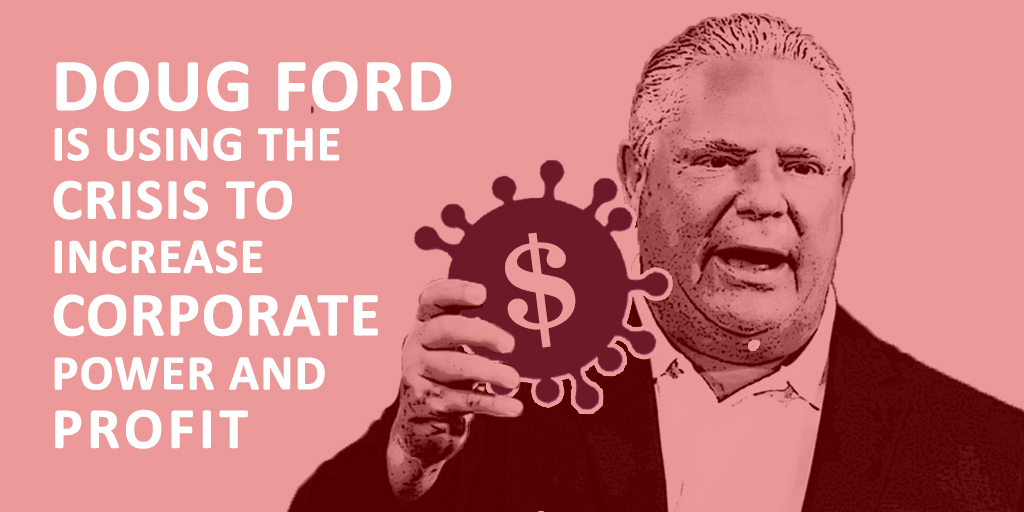
The second wave reveals the Ford government’s true colours
As we wrote last May:
“Before the current crisis Doug Ford’s approval rating had dropped to around 30%. In a December 2019 poll, Ford ranked last in popularity of all premiers in Canada. Since mid-March, there have been countless articles congratulating Premier Ford on his “handling” of the crisis. Ford’s presentation may look professional and sound sincere to corporate political commentators. His policies, however, are still biased against the working class.”
Indeed the government’s approval rating soared this spring and many were confused by the propaganda. Replacing the hard-right figure – who had attacked broader public sector workers, teachers and education workers, students, 2S/LGBTiQ folk, and Indigenous, Black and racialized people – was that of a sensitive, responsive premier who seemed truly distressed at the challenges facing working people in Ontario.
The pandemic fog which obfuscated the Ford government’s true nature has now lifted. According to an Abacus Research poll from October, the Ford government’s approval is down 8-percentage points while disapproval is up 9-points since May. Ford’s management of the Long-Term Care crisis and his austere approach to re-opening schools has the approval of only one third of Ontarians.
It is becoming apparent that the Ford government is using the pandemic to advance their longstanding reactionary agenda to deregulate, cut and privatize. New reforms, cynically justified by the health and economic crisis, are in line with other sweeping pieces of legislation that this government forced through before the pandemic that are designed to deepen exploitation in order to boost corporate profits and expand corporate power.
Here is a short overview of some of the recent legislation and regulatory changes by the Ontario government since May:
Bill 175, the Connecting People to Home and Community Care Act. This bill, passed in early July, will lead to further privatization of home care, including transferring control of home care from publicly controlled LHINs to the Ontario Health Teams which are stacked with for-profit companies. Further privatization will mean reduced services for vulnerable people requiring home care and further attacks on wages and working conditions of PSWs in the sector, who are disproportionately racialized women.
Bill 184, the Protecting Tenants and Strengthening Community Housing Act. The bill, also passed in late July, has been more appropriately renamed the “Mass Eviction Bill” by tenants. The new rules allow for immediate eviction orders should a tenant default on a repayment agreement pushed on them by their landlord. Previously, a tenant would have been able to explain why they were no longer able to keep up with a repayment agreement in a formal hearing, however this important right has been removed. Bill 184 is retroactive and applies to all repayment agreements since the beginning of the pandemic.
Bill 195, the Reopening Ontario (A Flexible Response to COVID-19) Act. This bill, passed in July, extends emergency orders and allows for their modification despite ending the state of emergency. It allows the government to override collective agreements, cancel vacations, and eliminate rights around seniority-based lay-offs, redeployment, work assignments, shift schedules and the grievance process. The Ford government has indefinitely suspended labour rights for health care workers.
Bill 197, the Economic Recovery Act. This is a piece of omnibus legislation passed in July that, among other things, guts the Environmental Assessment Act and violates the Ontario Environmental Bill of Rights with the enthusiastic backing of large developers. The government will now decide which projects need environmental assessments, as opposed to most requiring a review previously. Bill 197 also eliminates the key mechanism that allowed for the public to ask for a full review of a particular project and the bill allows for the bulldozing of opposition through new ministerial zoning orders (MZOs).
Bill 218 Supporting Ontario’s Recovery and Municipal Elections Act. This bill was passed in November. It makes it more difficult for Long-Term Care residents and their families to take any legal action against LTC homes for harm resulting from COVID-19. The legislation is retroactive to March, meaning that corporations like Chartwell, who raked in profits while residents and workers at their facilities were infected and died at disproportionately high rates, enjoy the full protection of the state. The bill also repeals the option for municipalities to use ranked ballots in municipal elections, blocking even the most timid step away from the undemocratic first-past-the-post electoral system.
Revoking Ontario Regulation 274. In October, Education Minister Stephen Lecce announced that the Ministry of Education was revoking seniority rights, by claiming that Regulation 274 limits hiring during the pandemic. This is an unprincipled attack on teachers, unions and public education, which the government will undoubtedly try to extend to the broader public sector. The Conservatives had been campaigning for the elimination of seniority rights for teachers since Regulation 274 was filed in 2012.
Regulatory Amendments under the Child Care and Early Years Act. In October, the Ministry of Education released a series of regressive proposed regulatory amendments to childcare. Childcare centres across the province are at risk of closing, jeopardizing crucial early development for children and threatening the employment and livelihood for tens of thousands of working parents. This is particularly true for working women, who face a huge setback in their struggle for equality. Instead of increasing funding and wages and decreasing fees and child to childcare worker ratios, Ford’s response is to lower caregiver to child ratios, reduce staffing requirements, and promote unlicensed childcare spaces.
These and many other examples show that Doug Ford and the Conservatives are using COVID-19 as a pretext for restructuring Ontario through privatization, deregulation and rollbacks to labour, tenant, environmental and equality rights.

Budget 2020 – More gifts to big business, massive austerity around the corner
Early November saw the Ontario government unveil their second budget since their election, delayed from the spring due to the pandemic. Many in the corporate media feigned surprise that the Ford government is willing to project the biggest budget deficit in the province’s history, after the same government had adopted a harsh austerity budget in 2019 under the guise of eliminating an exaggerated deficit. However, there has not been a significant change of strategy for this government. The 2019 cuts that were implemented were not being used to pay down Ontario’s relatively modest deficit but to cut tax revenue instead. The same holds for this budget. It contains more tax cuts to business and paves the way for even harsher austerity.
The deficit that the government is projecting is not being created by any significant investments in the public sector in order to drive job creation and recovery. The most obvious investments necessary to save lives during the pandemic are not there. This would include the hiring of more teachers to lower class sizes and massively increasing staffing in long-term care homes, which is one of the primary drivers of the thousands of avoidable deaths this year. Emergency health funding is budgeted for a couple years but overall health funding is set to be cut by $2.4 billion by 2023.
The Ontario government has done nothing for the million Ontario residents living on poverty-level social assistance during the pandemic. The inadequate supports that people have received have come almost entirely from the federal government. Ontario’s Financial Accountability Office (FAO) reported that provincial spending accounts for 3% of the $110 billion in direct pandemic related support to people, businesses and the public sector in Ontario. As of mid-October, the FAO reported that government had not yet spent $9 billion in federal money earmarked for pandemic spending.
While the Ford government is continuing their austerity agenda for the many, they have packed their latest budget with tax breaks and gifts for business. One such scheme is to subsidize some commercial and industrial hydro bills with $1.3 billion to cut corporate hydro bills by 14%. This is public money that is being used to subsidize the recently privatized Ontario hydro system, not for households but for businesses. The government has pledged that 94% of businesses will have reduced property taxes, by standardizing and driving down the Business Education Tax, shifting money directly from education to profits. More announcements have included permanent exemptions to 30,000 “small” businesses from paying the Employer Health Tax and more deferrals for WSIB payments.
Bill 124, the sweeping wage cut bill remains in place driving down wages across the public sector. The government estimates that this attack on collective bargaining rights will save them about $750 million in the first year of application to all Broader Public Sector agreements. This means that the wage cut roughly amounts to what is being paid out to business in the form of tax breaks.
The recovery that the Ford government is pushing is solely a recovery for corporate profits, a recovery that will mean continued and deepening crisis for the working class. Ontario is justifying its gifts to big business with tired, old, trickle-down economics ideology.
The Communist Party of Canada (Ontario) insists that this does not have to be the case – a People’s Recovery is possible. But it has to be fought for and won through an escalating campaign of mass action by the working class and its allies. The labour movement must take the lead in building a united movement of trade unions, Indigenous, Black and racialized people, women and gender oppressed people, students, unemployed workers, tenants and all others who are objectively opposed to the Conservatives and their corporate recovery.

The Communist Party demands emergency action from the province, to:
• Fund public healthcare – for hospitals to open closed wards and beds, for expanded hospital and healthcare staff across the province, for home visits to elderly and isolated people, for restored and expanded public health units and services.
• Put all LTC facilities under public ownership and operation, with funding for adequate and well-paid staff and sufficient protective equipment and procedures.
• Provide housing for all and protect tenants – by building social housing units and funding emergency shelters with sufficient safety measures, by legislating rent rollbacks and rent controls, and by banning evictions, renovictions and foreclosures.
• Introduce a provincial system to provide free, regulated, public childcare to all, with adequate levels of well-trained and well-paid staff.
• Provide needs-based funding to public schools, rollback and eliminate post-secondary education tuition fees, and eliminate student debt.
• Protect jobs and wages – through plant closure legislation to stop unjustified closures and layoffs, a livable minimum wage of $20 per hour and a ban on predatory private employment agencies.
Building a People’s Coalition for a People’s Recovery
At the time of our last meeting in May there was already spontaneous resistance occurring amongst healthcare workers and other essential workers who were fighting for access to decent PPE and health and safety. At that time there were few rallies occurring as a full lockdown was still in effect and the peoples’ movements were finding their feet in the first phase of the pandemic.
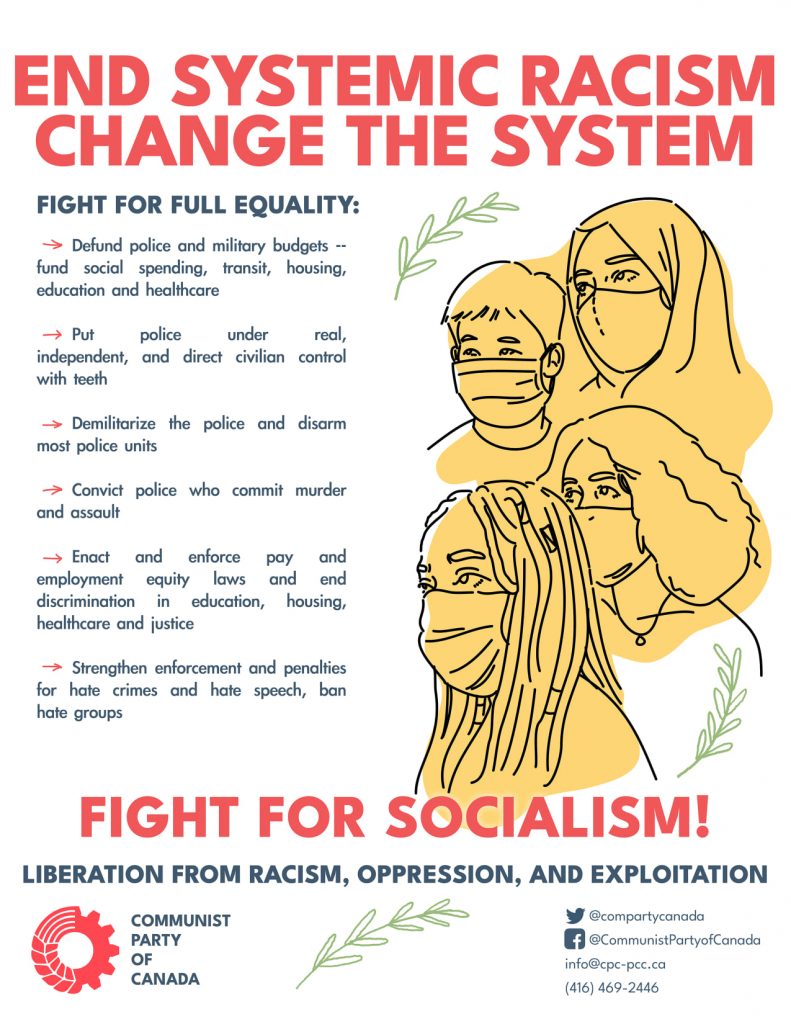
A couple weeks after our meeting a mass uprising against racist police murder and brutality was sparked by the murder of George Floyd by Minneapolis police. The movement quickly spread to Canada and around the world. In Ontario people fought for the recognition of racist policing in this province. Marches and rallies demanded justice after the death of Regis Korchinski-Paquet, a Black-Indigenous woman who fell to her death in the presence of Toronto police, and D’Andre Campbell, a Black man, was shot by police inside his home after being tased in Brampton in April. In late June, Malton resident Ejaz Choudry was shot and killed by police during a mental health crisis.
This fall, the Canadian court system’s systemic racism was again exposed after Daniel Montsion was found not guilty of manslaughter, aggravated assault and assault with a weapon. It is not disputed that Daniel Montsion, an Ottawa police officer, punched Abdirahman Abdi repeatedly in the head while wearing metal plated gloves. Abdirahman Abdi died from the beating.
Police impunity is a major problem born from racialized inequality seen right across Ontario. Northern cities and towns suffer at the hands of anti-Indigenous police violence. The Thunder Bay Police Service has been the subject of multiple reports describing systemic racism after it became clear that the police were ignoring murders and deaths of Indigenous people in that city.
These incidents and many others have underlined the need to defund and demilitarize the police and shift funding towards social spending. Movements and general consciousness against systemic racism have grown with big, largely spontaneous rallies taking place in dozens of cities across Ontario in June.
Despite pushback from the Province and right-wing dominated city councils, the Communist Party continues to fight for defunding the police and putting police under real, independent, and direct civilian controls with teeth.
Tenant unions and organizations have also become more active in recent months with evictions restarting in late summer and homeless encampments growing across the province. Some rent strikes have been organized and there are networks forming to physically disrupt evictions. Labour councils in Guelph, Durham Region and Toronto have passed resolutions to support tenants, demand the repeal of Bill 184, ban evictions, renovictions and foreclosures, bring in comprehensive rent control, and eliminate vacancy decontrol.
There is a real need to link up defensive battles against evictions with mass political action for policies that recognize housing as a human right. Amongst these demands is the building of permanent rent-geared-to-income social housing (where rent is based on 20% of household income) to meet the needs of underhoused and homeless populations of Toronto.
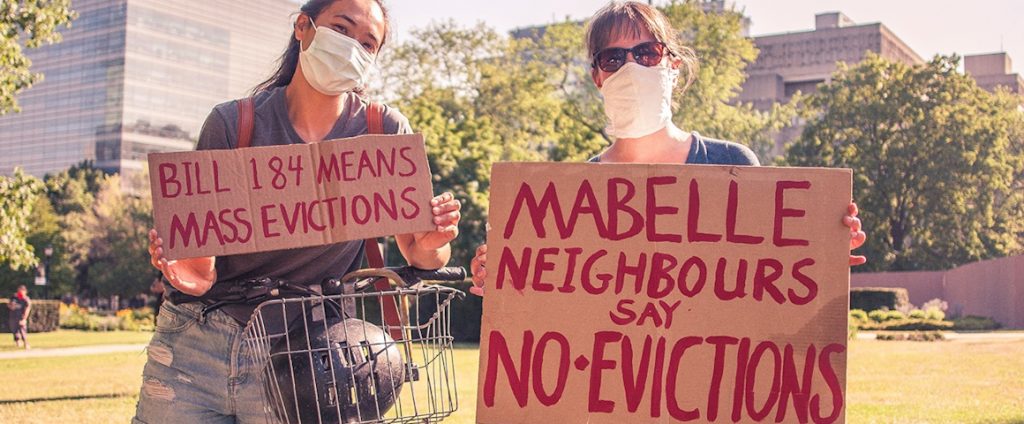
Solidarity with the struggles of Indigenous peoples for sovereignty and self-determination has also seen a resurgence in recent weeks. Early in the year, Ontario like the rest of the country, saw a massive wave of marches and direct actions in solidarity with the Wet’suwet’en who continue to fight pipeline development on their territory. This popular support has shifted towards solidarity with the Mi’kmaq’s treaty right to fish on the East Coast and with the Haudenosaunee reclamation site named “1492 Land Back Lane”.
Of particular importance to our committee is the struggle taking shape at Land Back Lane, where provincial courts, politicians and business are attempting to continue the theft of Indigenous land, a practice that has been repeated for centuries across Canada. The piece of land where Foxgate Developments is constructing residential buildings is part of the Haldimand Tract, land that the British colonial government agreed to recognize as belonging to the Haudenosaunee in 1784. This included 10 kilometers on either side of the Grand River.
The Ford government has chosen to fuel racism and encourage violence from the OPP, who have already made over 30 arrests, shot rubber bullets and tasered land defenders. The Premier has declared that the stand-off has been caused by “a few bad apples.” The cause of the current situation is centuries of ignoring land rights agreed to in treaties, decades of ignoring land claims, and when resistance surfaces, using police to brutalize Indigenous peoples.
The Communist Party of Canada (Ontario) demands that the repression and provocations by the OPP targeting Land Defenders at 1492 Land Back Lane end immediately. All attempts to construct housing on the territory must stop and the federal government must negotiate on an equal, nation-to-nation basis with the Haudenosaunee people for a just and peaceful resolution. We continue to help build solidarity with this important ongoing struggle.
While progressive movements have started to find their feet in the last few months, reactionary movements have also found a resurgence in their spreading of anti-science resistance to public health measures. The lack of economic support in place for the millions effected by the pandemic has created fertile soil for those on the ultra-right who peddle conspiracy theories with the easy solution that we should ignore the pandemic.
The capitalist parties are unable to take into account the immediate and deepening desperation faced by working people. And where is the labour leadership? The President of the Canadian Labour Congress is busy strengthening his relationship with the Canadian Chamber of Commerce by endorsing Bill Morneau to be the next OECD leader. Thankfully there has been a strong backlash to this move, from other executive officers and the leadership of most of the major affiliates. Notably missing from the criticism is Unifor, whose leadership has, in recent years, favoured a cosier approach to the federal Liberals. Tri-partitism is the road to irrelevance and defeat for the labour movement. Working people and those who try to make ends meet without a job, need a fighting militant leadership. We need independent political action now!
In Ontario, the Ontario Federation of Labour has adopted a more social unionist approach since last year’s Convention and the election of a new leadership. The OFL is regularly participating in solidarity with migrant worker organizing, Indigenous movements and anti-racist movements. Just before the pandemic, we saw the OFL, along with striking teachers’ unions, organize their first province-wide mobilization in several years to protest a Conservative Convention in Niagara Falls.
These are positive steps forward. Building solidarity with movements is important and necessary, but there is still a long way to go for the OFL to assume their role in leading the whole labour movement in escalating mass action. The OFL’s political action is tied directly to the NDP, and the countdown clock to the next election is still a main feature on their website. The Alberta Federation of Labour has shown some real organized fightback recently with strikes against the Kenney Conservative government in that Province. It is this unity and militancy that is needed in Ontario in order to defeat the Ford government’s corporate agenda for Ontario and to win key pieces of a People’s Recovery.
Recent organizing around a left caucus inside the labour movement has shown promising signs. Many trade unionists have participated in recent organizing meetings of the Action Caucus in an attempt to build a structured left caucus. These workers realize the immediate need for mass, independent, labour political action. We salute these important steps forward and will continue to support these efforts.
As the capitalist health and economic crisis continues to deepen, the Communist Party has an important role to play in order to strengthen the fightback, to put forward immediate necessary demands for a People’s Recovery, and to fight for socialism as the only alternative to capitalism. These three tasks are complimentary and urgently necessary.

